|
terre thaemlitz writings 執筆 |
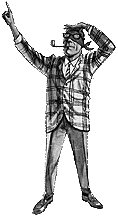

|
How MAD's Dave Berg and Roger Kaputnik Introduced Me To Post-Modernity - Terre Thaemlitz |
It was some time during my eighth or ninth year - still living in the void of preconsumerism - that books from MAD's "Dave Berg Looks At... " series began mysteriously materializing on my shelf. I was living in a Catholic household in a micro-burb outside of the suburb of West Saint Paul, Minnesota. The only people of color that I knew were a Ugandan college exchange student who had lived with us briefly, and my sister who had been adopted from a Korean orphanage. From what I heard, issues of 'race' and ethnicity revolved around a rivalry with the upscale, primarily-Jewish subdivision across the highway. Class issues ditto, only to be confused by the fact that my mother grew up in a Jewish ghetto because her family was too poor to live in the Catholic Italian ghetto. Immersed in my youthful White middle class asperations, I found Roger Kaputnik, Superliberal, very funny. As I grew older and began to blossom into a gender-blending post-n freak (wherein n=any idiological variable), my other MAD books by Don Martin and the rest of the "Usual Gang of Idiots" were gradually abandoned - even disavowed at times. Yet I still found myself reading Berg's books over and over again. For years I've tried to take this at face value - a random pre-adolescent thread woven lenthwise through the tapestry of my life. But in my relentless mania to uncover the 'nurture' behind my nature, to decipher the third-party political agendas behind my most subjective whimseys, the fact that Berg has been on my shelf "Looking at... ME" for two decades has to be big. Well, I think I've finally found a way to talk it up, and, I think I just might have a shot at securing its proper documentation in the cultural annals.
HYPOTHESIS:
Dave Berg's continual invocation of surveillance, combined with his self-placement as a subject of surveillance, is in fact a movement away from Modernist models of critique in which the critic presumes a peripheral "bird's eye view" outside of the cultural workings under critique. The "Berg's eye view," on the other hand, occurs within the sphere of cultural influence, self-consciously undermining the authority of Berg's observations by making them symptomatic of the very circumstances he critiques. Enter the post-Modern condition, and my first significant literary connection thereto.
I. SCOPE OF VISION
Berg's representations of himself as surveyor, both on his book covers and as the character Roger Kaputnik (a name Berg jokingly gave to himself as a child growing up in a family with too many children for his mother to always readily remember all of their names), always includes his trademark thick, black, outdated glasses. Glasses which bring clarity to critical inspection, as well as imply an ideological basis in faulty vision. As the comic fall guy in many of his strips, Roger Kaputnik repeatedly finds himself as the flawed liberal caught in circles of logic, having his own words distorted and thrown back at him by more conservative right-wing characters. In a ceaseless torrent of bourgeois White Liberal Guilt, Berg is always aware that something is wrong, but befuddled at the moment before social revelation or political action could occur. He is politically inactive, trying not to cause waves, but at the same time disappointed by the implications of going along with a crowd of nincompoops. It is in this manner that Berg portrays himself (and possibly his wife?) being led in allegiance by a bigot at best, White Supremacist at worst (Fig. 1).
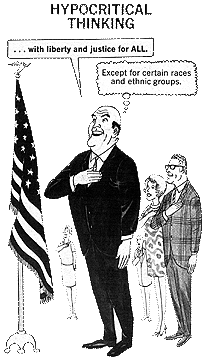 |
| Fig. 1 |
II. MOBILITY AND FEARFUL PARALYSIS
Berg considers himself representative of Middle America, while at the same time having a sneaking suspicion that undesirable conservatism and narrow-mindedness inhabit the core of dominant cultural forces which formulate his 'normal' existence. The result is a sense of paranoia and surveillance typical of the White Liberal subject who desires both cultural order and individuality. Berg's need to police his own desires so as to keep from assimilating with the conservative cesspool, coupled with a fear of social ostracization for being too 'radical' or 'left-wing,' keeps him emotionally on edge, civic minded and politically passive.
While it is easy and commonplace to cite the liberal aversion to direct action as part-and-parcel of the bourgeois love affair between public and private, etc., that doesn't particularly help me understand my parents or my own absorption of bourgeois ideals without ever actually being a full-fledged member of the middle-class bourgeoisie. So, granting Berg the same leeway, we find there is a more specific material basis of experience that makes his portrayals of flawed liberalism so compellingly complicit. Berg's parents immigrated from Lithuania at the turn of the century, his father being forced to change careers from book binder to construction worker. In an interview for Pipes and Tobaccos, Berg recalls, "My parents would say, 'We never had a chance, but you do, so make the most of it.'" Following his parents' advice to honor education and make good, Berg's paranoid awareness of not doing enough is inextricably linked to a fear of 'losing it all.' A theme played out time and time again in Berg's portrayal of the 'newly arrived' middle class of the 1950s and '60s (Fig. 2).
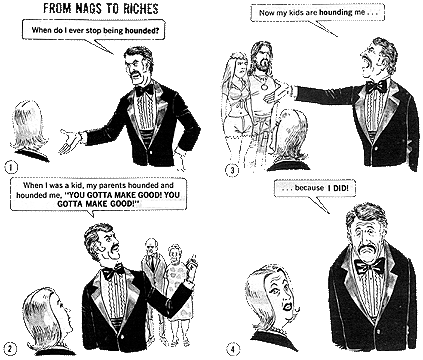 |
| Fig. 2 |
III. SURVEILLANCE AND DE-ACTION
Berg's internalization of self-surveillance is coupled with a neurotic subjugation to the influential powers of the gazes put upon him by both government and the neighbor next door (Fig. 3).
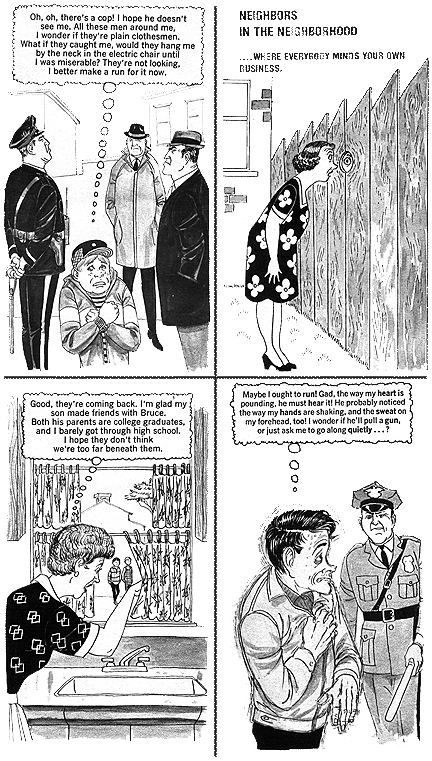 |
| Fig. 3 |
In this manner, Berg's only conceivable course of action becomes the cataloging and distribution of his own observations as manifestations of the power of his own gaze. Direct action and civil disobedience are the logical conclusions which he continually arrives at, and must continually diffuse. For Berg, this need to diffuse became ever more urgent during the height of the Civil Rights Movement at the end of the '60s and early '70s, when Roger Kaputnik and friends found their homes overrun by socially disgruntled hippy youngsters (Fig. 4).
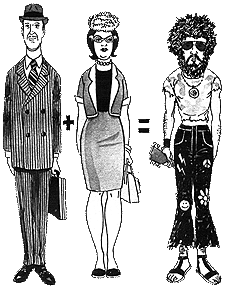 |
| Fig. 4 |
Largely at the expense of trivializing everything accomplished by direct action at that time, Berg has consistently portrayed Radical Leftism as a perverse form of inverted dandyism inextricably detached from the experiential bases it wishes to reform (Fig. 5).
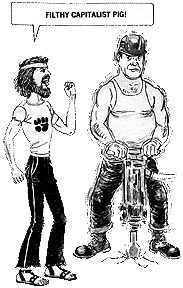 |
| Fig. 5 |
For Berg, the actions of the Left target the experiences of poverty and oppression associated with his own childhood - experiences of which Roger Kaputnik and the 'newly arrived' middle class strove to keep their children ignorant. For Berg, a Left consisting solely of middle class hippy teens must therefore be operating on faulty information unfounded in experience. While such a synopsis is offensive in its inability to consider a basis of social action beyond middle class experience, it is consistent with Berg's desire to place the critic within the subject of critique, coupled with a 'blindness of vision' executed in his own prioritization of middle class ideals.
As a child I found Berg's puzzling interjection of class issues new to my understanding of civil rights issues which had previously existed in the 'classless' bourgeois ideals of the rights of man. And I can't help feeling that in some way it prepared me to address such concerns in my own activism around healthcare issues in the late '80s and early '90s. (Hmm... perhaps that's an admission you could have done without.)
IV. HEREAFTER
For Berg, the inability to conceptualize direct action is resolved in his Judaic faith, and the religious convention of idly passing one's time in this world until she is called to the next one. I find it no small coincidence that during the late '60s and early '70s, at the precise moment he became fixated with attacking the Hippy Left, Berg was actively lecturing on religious topics at campus events, the transcripts of which were ultimately compiled and published in My Friend God. But within Roger Kaputnik's paranoia remains the fear that the Master Plan may be no more than a trick by The Man, and that a "What me worry?" outlook is not so much an exercise in blind faith as a subjugation to the material (Fig. 6).
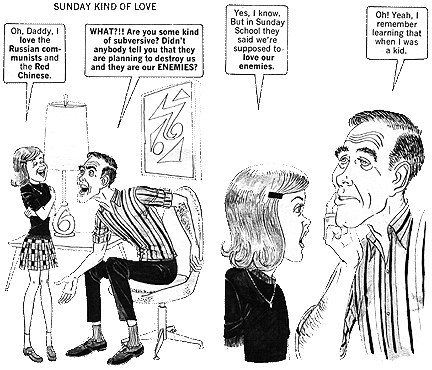 |
| Fig. 6 |
Terre Thaemlitz is a producer of theory-laden computer music for such labels as Mille Plateaux (Germany), Daisyworld Discs (Japan), and his own Comatonse Recordings. He has released seven solo albums; two collaborative albums (one with Bill Laswell); numerous 12" singles; as well as remixes for the Golden Palominos, Material and Haruomi Hosono, among others. Thaemlitz' works examine the flaws in sound's contradictory cultural functions as a socializing force and a means of subjective release. In particular, Thaemlitz is concerned with drawing strategic parallels between electroacoustique audio production and anti-essentialist transgenderism. His albums are typically found in large record stores misfiled under "Pop/Rock."